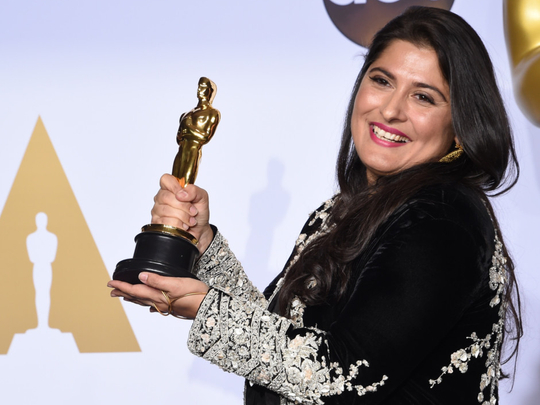
Holding the Oscar on February 29, for the best documentary, A Girl in the River: The Price of Forgiveness, Pakistan’s Sharmeen Obaid Chinoy proudly said: “This is what happens when determined women get together.”
Four years ago, she had created history by becoming Pakistan’s first Oscar winner for her equally powerful documentary Saving Face. Her new film is the story of a 19-year-old survivor of an ‘honour killing’ — the practice of killing women who have ‘dishonoured’ the family, which is still common in Pakistan. A private showing was held for Pakistan Prime Minister Nawaz Sharif, which moved him to publicly promise that Pakistan would enact appropriate laws to eliminate this scourge from the country.
In what appears to be a propitious day, the Governor of Punjab, Pakistan’s largest province, covering more than half the population, signed the landmark Women’s Protection Bill into law on Monday, aimed at protecting women against societal injustices. Several opportunist religious parties, also part of the governing coalition, were up in arms, claiming the law was against Islam.
Pakistan is in the top five most-dangerous countries for women, along with India. Though it has made a number of key international commitments to gender equality, Pakistan is ranked 144 out of 145 countries surveyed — the second worst — in the 2015 World Economic Forum Gender Equality Index. Pakistani women constitute half the population of nearly 190 million.
Paradoxically, Pakistan was the first Islamic country to elect a woman prime minister, Benazir Bhutto, and is home to the youngest Nobel Prize winner, Malala Yousufzai. Pakistani women have conquered Mount Everest, they fly fighter jets and sit in many top academic positions. Many other Pakistani women have had leadership roles, and now Chinoy is a driver of change. Yet, the reality of Pakistani women’s everyday living defies an easy description.
Women in Pakistan live with widespread gender-based discrimination, attitudes that are preserved by patriarchal, tribal and cultural traditions and the twisting of Islamic injunctions. Discriminatory legislation, unresponsive state institutions reinforce this inequality.
Killing women for ‘honour’ — the subject of Chinoy’s documentary — for marrying a person of their own choice, something that is allowed by religion and law, is a feature in Pakistani society. The real figures, believed to be higher, may never be known, but the government last year admitted on the floor of the National Assembly that there were 456 and 477 such cases reported in 2013 and 2014, respectively. As close family members commit these murders they are not reported. Only in one case has the state pursued the killings as murders.
The Human Rights Commission of Pakistan (HRCP) claims on the basis of the Pakistan Demographic and Health Survey that 39 per cent of 15 to 49-year-old married women have been subjected to abuse by their spouse and one in ten has experienced violence during pregnancy. Due to social taboos more than half the women who experienced violence, kept it secret.
The societal bias against women, which was institutionalised during General Zia Ul-Haq’s regime (1977-88), has resulted in massive abuse against women.
Feeble attempts by Benazir and General Pervez Musharraf to undo such laws floundered against opposition from the ‘mullahs’. Many of these laws continue to deny women their constitutional rights to gender equality, raising legal and administrative barriers to their political and economic empowerment.
Pakistan’s successive governments have demonstrated little courage in standing up to the clergy who consider women ‘a commodity’ and vehemently oppose any progressive legislation. And any change that has been approved, the governments have been too lax in implementing them. Pakistani men, it seems, are not ready to give up male privilege.
One major reason why these oppressive attitudes and customs have persisted is the low level of education among women in Pakistan. According to the 2015 United Nations Development Programme (UNDP) Human Development Index, Pakistani women spend only seven years in education compared to men who are marginally better with 8.5 years. With only 1.9 per cent of gross domestic product earmarked for education, women end up benefitting even less. Pakistan is meeting only nine of its 33 indicators on women’s empowerment for the Millennium Development Goals, says the UNDP report.
Educated urban women, from well-provided families, who, like Chinoy, should be drivers of change in Pakistan, have mostly chosen lives that are not resistant to societal norms. The premium on their education is not what they give back to society, but finding a good marriage match. There are few people like Chinoy bringing forth the plight of women who are suffering the strangulation of a culture often misrepresented in the name of religion.
Educating and empowering women can address many of Pakistan’s problems. While the ruling structure dithers, ‘determined women’ such as Chinoy, Yousufzai and others are the trailblazers in Pakistan and much of the developing world.
Sajjad Ashraf is an adjunct professor at the Lee Kuan Yew School of Public Policy, National University of Singapore. He was a member of Pakistan Foreign Service 1973-2008 and served as Pakistan’s consul general in Dubai 1996-1998.










